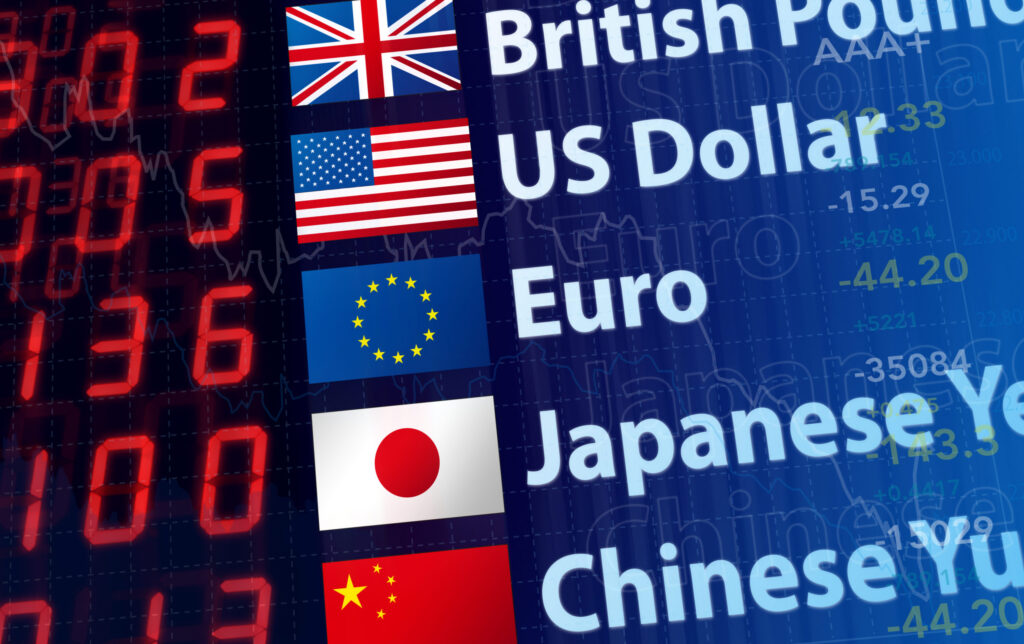Vantage uses cookies that are essential for our website to work. We also use optional analytical cookies to help us to improve our website and the services, content and ads we provide to you which you can accept or reject here. Please see our Cookies Policy for more information on how we use cookies.
CFDs and Spread Bets are complex instruments and come with a high risk of losing money rapidly due to leverage. 73.5% of retail investor accounts lose money when trading CFDs and Spread Bets with this provider. You should consider whether you understand how CFDs and Spread Bets work and whether you can afford to take the high risk of losing your money. Please seek independent advice if necessary.
Why Spreads are Important in Trading
One of the tips that traders are given when they choose a broker is to find a firm that charges the lowest spreads. The term “spread” in the financial markets usually refers to the difference between two prices, interest rates, or yields. However, the term is mostly used in trading to refer to the difference between the buy and sell price of an asset. Whether it is futures contracts, currency pairs, options or stocks, you will find a difference in the buy and sell prices (also known as bid and ask prices). This difference is the spread.
Understanding Spreads
The amount by which the ask price exceeds the bid price is the bid-ask spread. When a trade is executed, the seller receives the bid price and the buyer gets the ask price. Spreads are usually how brokers are compensated for the use of their products and services. They charge spreads on some assets, and might charge a commission on others. So, the spread is the way in which you execute your trades and can add to the cost of your trading.
When trading an asset with a spread, the aim is for the asset’s price to rise beyond the spread amount. This is when the trader can earn a profit. This means that even if the market moves in a favourable direction, the trade could close at a loss unless the price moves above the ask price plus the spread. The bid-ask spread represents the supply and demand of any asset. It also indicates whether the sellers and buyers have a similar opinion about the worth of an asset. If the spread of an asset is tighter, which means the bid and ask prices are close to each other, it indicates a matching opinion between sellers and buyers. On the other hand, a wider spread, where the bid and ask prices are far apart, represents a large difference in supply and demand.

What is Bid and Ask Price?
Market makers and other financial firms play an important role in determining the spread for any asset. These market makers offer to sell or bid to purchase the asset at specific bid and ask prices. They are the counterparty to the trader. The market makers earn a profit out of the difference between the bid and ask price (the spread). Thus, the spread is also referred to as the principal transaction cost of trading, apart from any brokerage fees. The whole process is known as “crossing the spread,” from which revenues are generated by brokerage firms.
Apart from market makers and professional traders exploiting the bid-ask spread, certain market phenomena also impact the size of the spread.
Factors that Determine the Spread
Three main factors impact the bid-ask spread:
- Volume: This refers to the quantity of an asset traded on a daily basis. If the trading volume is high, the bid-ask spread tends to be tighter/narrower and vice versa.
- Liquidity: Similarly, if an asset is highly liquid, its bid-ask spread tends to be narrower, while the spreads for an asset with low liquidity tend to be wider.
- Volatility: Prices move rapidly in volatile markets. This leads to a widening of the spread. Spreads tend to be narrower in a stable market.
Remember that spreads in the forex market can vary through the day, ranging from low to high. You will also find that some currency pairs tend to see tighter spreads than others. This has a lot to do with factors such as trading volume and volatility. Major currency pairs, such as the GBP/USD and EUR/USD, experience very high trading volumes, compared to emerging market currencies. This leads to spreads being lower for major forex pairs under normal market conditions.
A higher-than-normal spread usually indicates high volatility or low liquidity. You could also see higher spreads while trading after market close. Since the forex market functions 24 hours a day, spreads can differ across market sessions. For instance, the London and New York sessions are likely to see lower spreads under normal conditions, especially when the two sessions overlap.
Spreads can also rise due to market-moving events. Events such as Brexit and the US presidential election are examples of such events. News regarding inflation and other macroeconomic and geopolitical situations can also affect spreads. Major economic indicators, such as the US NFP, GDP data and interest rate changes by central banks, also tend to affect the spread.
Spreads in the Forex Market
In Forex trading, you trade one currency against another, where you buy one currency and sell the other. Therefore, trading in the forex market occurs with spreads. If you look at the price quoted for the currency pair, you will see the difference in the buy and sell prices. This difference is the bid-ask spread for the currency pair. The unit for measuring spread in the forex market is called “pips.” Pip is the smallest change in price in a currency pair, where one pip is usually the last or fourth decimal point of the price quote, such as 0.0001. The exception is the Japanese yen, where one pip is equal to 0.01, since the yen is quoted up to two decimal points.
While in stocks and other assets, the buy and sell prices are quoted for the same security, in the forex market, the bid price is the price for the base currency and the ask price is for selling the quote currency. For instance, suppose the bid price for the GBP/USD is 1.3079 and the ask price is 1.3085.
Here, GBP is the base currency, and you can buy one unit of the pound sterling for $1.3091, since the USD is the quote currency. On the other hand, the selling price for the GBP is $1.3093 per unit. So, the bid-ask spread, in this case, is 0.0002.
How to Calculate the Bid-Ask Spread
The first step in calculating the spread is to find the difference between the bid and ask prices in terms of pips. This can be done by subtracting the bid from the ask price. So, if we go back to the above example of the GBP/USD:
$1.3093 – $1.3091 = 0.0002 = 2 pips
Now, you need to multiply this spread by your lot size to estimate how much it will cost you.
Continuing with the same example, let’s calculate the spread for a mini lot:
Spread = 2 pips per unit
Mini lot = 10,000 units
Cost of pip per mini lot = $1 (The cost per mini lot will differ from one broker to the next)
Therefore, total spread for the mini lot = $1 x 2 = $2
Tighter spreads or lower pip values means that the cost of trade declines for the trader. This is why traders prefer brokers who offer the tightest spreads, starting as low as 0.0 pips.
Strategies to Trade with Spreads
Here are some strategies you can use to minimise the spread while trading forex.
1. Choose forex pairs with high liquidity
As mentioned earlier, some forex pairs tend to see higher liquidity than others, which then leads to lower spreads for these pairs. Major currency pairs, such as the EUR/USD, GBP/USD, USD/JPY and USD/CHF, witness among the highest trade volumes. This leads to these pairs being highly liquid, which in turn leads to tighter spreads. On the other hand, forex pairs that include emerging market currencies, such as the USD/ZAR or USD/BRL see much lower trading volumes and therefore have lower liquidity and higher spreads.
2. Choose the Time of Day
Remember, major forex market sessions, such as the Sydney, Tokyo, London and New York sessions, see the higher trading volumes. The spreads during these sessions, therefore, tend to be lower. In fact, spreads are lowest between 8:00 am to 12:00 pm ET, when the London and New York sessions overlap. This is when the highest volume of trading tends to occur. So, choose your hours of trading based on these parametres.
3. Begin Small
As a beginner, it is best to start out with smaller lot sizes. Once you gain familiarity with the market and fine-tune your trading strategy and style, you can gradually increase your position size. Smaller positions only help make it easier to calculate the risk and return but also limit the maximum losses you could potentially face.
4. Keep an Eye on the News and Economic Calendar
Since economic releases, geopolitical news and other market events tend to impact forex prices and therefore the spread, it is useful to stay updated on the latest news and developments. Following an economic calendar is a good way to do so. This lets you know when to expect market-moving economic releases and the market expectations for each release. This can help you prepare in advance for price and spread changes.
Also, remember to make the most of the technical analysis tools offered by MT4/MT5 to make informed entry and exit decisions, place stop losses and implement other risk management measures.
How do Spreads Impact Stop Loss Levels?
When there is uncertainty regarding a news event or when volatility is expected to rise, liquidity providers tend to mitigate some of their risks by increasing the spread. The problem for traders is that when the spread suddenly widens, especially if the difference is significant, it could lead to a margin call or even the trader’s position(s) being closed. This is why it is recommended to factor the spread into your stop loss decisions.
Whenever you open a trade, it is advisable to also place a stop-loss. This is the price level at which your position will be closed. This helps limit losses, since you automatically exit the position before losses mount when the price moves in an unfavourable direction. Stop losses should be put in place for both buy and sell orders.
Final Thoughts
One last thing you should know about spreads is that they can be variable or fixed. Fixed spreads remain the same throughout your trade, regardless of the timeframe for which your position remains open, while variable spreads change as asset prices change. In forex trading, spreads tend to be variable. Firstly, in the forex market, the bid price tends to be higher than the ask price. Also, the bid and ask prices change frequently, and so do the spreads. This makes it important to keep an eye on the market, so that any sudden widening of spreads doesn’t lead to a margin call or your position being closed.
While both fixed and variable spreads come with their own set of pros and cons, with variable spreads, there is usually no risk of requotes. In addition, there could be times when the spread is tighter than the fixed rate. Another advantage is that variable spreads tell you a lot about market liquidity. This can help you with decision-making as low liquidity could mean higher spreads and have greater potential for slippage.
As a beginner, start with a demo account to familiarise yourself with bid and ask prices, spreads and the factors that influence these rates. The demo account mimics real market conditions and is therefore a good way to learn how spreads work when trading forex.
Disclaimer
Vantage does not represent or warrant that the material provided here is accurate, current, or complete, and therefore should not be relied upon as such. The information provided here, whether from a third party or not, is not to be considered as a recommendation; or an offer to buy or sell; or the solicitation of an offer to buy or sell any financial instruments; or to participate in any specific trading strategy. Any research provided does not have regard to the specific investment objectives, financial situation and needs of any specific person who may receive it. We advise any readers of this content to seek their own advice. Past performance is not an indication of future results whereas reference to examples and/or charts is solely made for illustration and/or educational purposes. Without the approval of Vantage, reproduction or redistribution of this information is not permitted.
Latest Releases
-
How to Buy Bonds in the UK
Bonds are a popular debt instrument that can offer capital gains, steady income or potential to profit from speculation. Here’s …
-
Forex Broker UK – All You Need to Know
Forex brokers offer retail investors in the U.K. speed, convenience and cost savings for global forex trades. Here’s what you …
-
Top 5 UK Stocks to Buy in 2023
From aviation to banking and property development, we picked five best U.K. stocks listed on the London Stock Exchange to …
-
May 15,2024
The Role of AI and Machine Learning in Forex Trading
Explore how AI and machine learning are revolutionising forex trading, enhancing decision-making and increasing market efficiency.
-
May 15,2024
Mastering Forex Risk Management
Learn how to manage forex risk effectively to protect capital and optimise returns, despite market volatility and global economic events.
-
Apr 08,2024
AI and Reactivity – How AI Can Enhance Trading News Reaction Times
Explore how AI transforms trading news response times, ensures swift reactions, and mitigates risks in the fast-paced financial markets.









